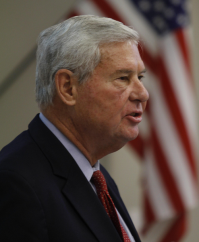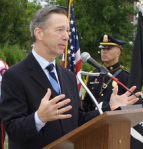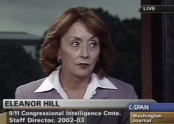
Rep. Walter Jones: “I was absolutely shocked by what I read. What was so surprising was that those whom we thought we could trust really disappointed me…It does not deal with national security per se; it is more about relationships. The information is critical to our foreign policy moving forward and should thus be available to the American people.” Source
“It was 28 pages and it probably took me a good hour and a half because I would have to re-read certain parts of it that I just couldn’t believe what I was reading.” Source

Sen. Bob Graham, co-chair of the Joint Congressional Inquiry into 9/11: “The 28 pages primarily relate to who financed 9/11 and they point a very strong finger at Saudi Arabia as being the principal financier.” Source
“I was stunned that the intelligence community would feel that it was a threat to national security for the American people to know who had made 9/11 financially possible.” Source
“At the time that we heard that it was being censored, Senator Dick Shelby, Republican from Alabama who was the vice chair of the Senate committee and myself as (Democratic) chair, both agreed that there was no reason to censor that 28-page, important chapter.” Source
John F. Lehman, 9/11 Commission member: When asked by 60 Minutes if the 28 pages include specific names: “Yes. The average intelligent watcher of 60 Minutes would recognize them instantly.” Source
“I personally read the 28 classified pages…In my view, the release of those pages would in no way implicate or harm our national security interests. To the contrary, I believe the disclosure of those 28 pages of the Joint Inquiry report would greatly assist policymakers and the public in better understanding many of the threats we now confront.” Source: Sworn statement offered as an exhibit in 9/11 victims’ suit against Saudi Arabia.
“We’re not a bunch of rubes that rode into Washington for this commission….we’ve seen fire and we’ve seen rain and the politics of national security. We all have dealt for our careers in highly classified and compartmentalized in every aspect of security. We know when something shouldn’t be declassified….those 28 pages in no way fall into that category.” Source

Rep. Thomas Massie: “It was a really disturbing event for me to read those. I had to stop every two or three pages and rearrange my perception of history. And it’s that fundamental — those 28 pages….It certainly changes your view of the Middle East…There is nothing in there that would affect our national security. Some of it may be embarrassing; that is why I believe those 28 pages have been withheld…the American people deserve to know what happened and what led up to 9/11 so that we can prevent the next one.” Source
“You have to write a letter to (the House Intelligence Committee chairman) and the ranking member and then they talk and agree to let you go down to the classified room. There’s a guard there and…he sees who you are, looks at your voting card, and then they let you in; and then there’s actually a staffer who knew you were coming down that sits in there and watches you read it, because you cannot make any notes and you can’t take anything out.” Source

Rep. Stephen Lynch: “It gave names of individuals and entities that I believe were complicit in the attacks on September 11. They were facilitators of those attacks. They are clearly identified…how people were financed, where they were housed, where the money was coming from, the conduits that were used and the connections between some of these individuals.” Source
“For our own intelligence purposes, there may be some very embarrassing facts, some very embarrassing moments, and some criticisms on our own intelligence service because of what happened, if all the facts come out. I think that those individuals (in the intelligence community) don’t want this to come out. They don’t want the facts to come out because it may reveal terrible, terrible errors on their part and they may bear part of the blame.” Source
Rep. Rick Nolan: “The information presents a clear and startling picture of who financed the attacks.” “They confirm that much of the rhetoric preceding the U.S. attack on Iraq was terribly wrong.” Source
“I first learned about it from constituents.” “The account in those 28 pages is pretty detailed; who supplied them money, what those accounts were, what the amounts of that money were, who the recipients were.” Source
Former Sen. Byron Dorgan: “I am absolutely convinced that the American people deserve and need to see what’s in those pages, because only then will they fully understand that they can connect the dots to the financing and other things. It’s just sad to me that’s been labeled ‘top secret.’” Source
Unnamed government official: “There’s a lot more in the 28 pages than money. Everyone’s chasing the charities. They should be chasing direct links to high levels of the Saudi government. We’re not talking about rogue elements. We’re talking about a coordinated network that reaches right from the hijackers to multiple places in the Saudi government.”
“If the 28 pages were to be made public, I have no question that the entire relationship with Saudi Arabia would change overnight.” Source
 Eleanor Hill, staff director of the joint congressional inquiry: “I can’t tell you what’s in those 28 pages. I can tell you that the chapter deals with information that our committee found in the CIA and FBI files that was very disturbing. It had to do with sources of foreign support for the hijackers.” Source: The Eleventh Day: The Full Story of 9/11, by Anthony Summers & Robbyn Swan.
Eleanor Hill, staff director of the joint congressional inquiry: “I can’t tell you what’s in those 28 pages. I can tell you that the chapter deals with information that our committee found in the CIA and FBI files that was very disturbing. It had to do with sources of foreign support for the hijackers.” Source: The Eleventh Day: The Full Story of 9/11, by Anthony Summers & Robbyn Swan.